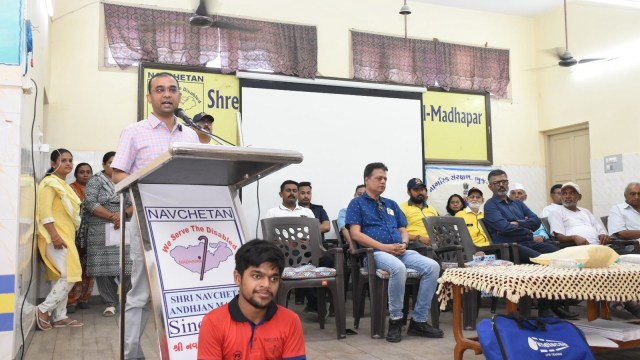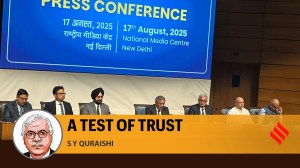Kutch launches braille module of civil defence training for differently abled
"Civil defence training through braille is a quintessential marker towards an equitable society" said Deputy Controller Civil Defence (Kutch), Dhaval Pandya
 The district's civil defence department is now in the process of creating Hindi and English versions of the braille training material. (Express Photo)
The district's civil defence department is now in the process of creating Hindi and English versions of the braille training material. (Express Photo)In a unique, first-of-its-kind initiative, the Civil Defence Office of Kutch district, recently held training sessions for the differently abled persons, also releasing the first Gujarati braille module for the purpose of training. The district’s civil defence department is now in the process of creating Hindi and English versions of the braille training material to share with the headquarters in Gandhinagar as well as New Delhi for implementation in other civil defence units.
Additional Collector of Kutch and Deputy Controller Civil Defence (Kutch), Dhaval Pandya, told this newspaper that the Gujarati braille module, released by Kutch District Collector Anand Patel, at the inauguration of the training programme on April 30 is all set to be translated into Hindi and English. Pandya said, “Civil defence training through braille is a quintessential marker towards an equitable society. As per the 2011 census, there are 50 lakh visually impaired people in the country. The 2011 census also registered over 26.8 million PwDs (persons with disabilities) in India, with more than a million in Gujarat. With the 2019 National Disaster Management Authority (NDMA) guidelines, India is one of the few countries with specific national guidelines on disabilty-inclusive disaster risk reduction. We cannot ignore the differently abled and so this was an exercise for an inclusive civic participation to transform disaster preparedness… The measure of a nation’s strength lies not in how it treats its most privileged, but in how it empowers its most vulnerable.”
Inspired by the basic tenets of the Disability-inclusive Disaster Risk Reduction (DiDDR), the training seminar conducted in Bhuj saw more than 150 physically challenged students and employees of the Navchetan Andhjan Mandal of Kutch receive basic civil defence training by Pandya and volunteers of Civil Defence Office at Bhuj. “DiDDR ensures that individuals with disabilities are actively involved in and benefit from disaster preparedness, response and recovery efforts. It recognises that persons with disabilities are often disproportionately affected by disasters and may face unique challenges in accessing information, evacuation, and support,” Pandya says.
 DC Patel said that these braille training modules will be helpful in imparting the basic civil defence training to similar individuals across the state and the country. (Express Photo)
DC Patel said that these braille training modules will be helpful in imparting the basic civil defence training to similar individuals across the state and the country. (Express Photo)
Considering diverse communication needs and physical barriers of people with disabilities, upon a joint initiative by the Civil Defence Office of Kutch and Navchetan Andhjan Mandal, training modules pertaining to basic information on civil defence organisation, community health and first-aid, fire safety, 108 emergency ambulance service and Abhayam Mahila helpline were converted into braille by the Duxbury Braille Translator (DBT). These braille modules were then printed in braille and given to the visually impaired students during the training seminar. The same were also incorporated in Orbit, a 3-in-1 unique device that serves as a self-contained book reader, a note-taker and as a braille display by connecting to a computer or smartphone via USB or Bluetooth.
“Training modules were also converted into accessible EPUB files, which can in turn be converted into audio, braille, soft braille and large print. The braille module and EPUB publications will serve as an important training tool for other civil defence offices across the state and the country. In addition, arrangements were made for simultaneous instructions in sign language for hearing-impaired students,” Pandya added.
District Collector Patel lauded the initiative and stressed on the fact that it is both a moral imperative and a pragmatic necessity that we extend the ambit of civil defence training to encompass differently abled compatriots. He further said that these braille training modules will be helpful in imparting the basic civil defence training to similar individuals across the state and the country.
Pandya said, “The entire training session included four training modules. First module covered an overview of the civil defence establishment in the country. Second module on community health and first aid covered basic first aid skills to respond to emergencies before professional help arrives and included topics such as wound care, burn treatment, fracture immobilisation, choking response, CPR (cardiopulmonary resuscitation), managing bleeding, shock or fainting, etc. Third module on fire safety included basics of fire prevention, detection, containment and evacuation. The last module dealt with practical demonstration on the basic and advanced life support systems equipped by the 108 ambulance service…”
The website of the Directorate of Fire Service, Civil Defence and Home Guards states, “Historically, the Civil Defence Policy of the Government of India, till the declaration of Emergency in 1962, was confined to making the States and Union Territories conscious of the need of civil protection measures and to ask them to keep ready civil protection paper plans for major cities and towns under the then Emergency Relief Organization (ERO) Scheme. The Chinese aggression in 1962 and the Indo- Pak conflict in 1965 led to a considerable re-thinking about the policy and scope of Civil Defence… The Civil Defence Act, 1968, provides for affording protection to any person, property, place or thing in India or any part of the territory thereof against any hostile attack, whether from air, land, sea or other places, or for depriving any such attack of the whole or part of its effects, whether such measures are taken before, during, at or after the time of such attack. It also authorized the raising of the Civil Defence Corps and for making Rules and Regulations for Civil Defence.”







